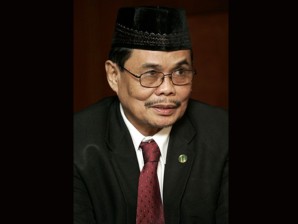Panels may not complete peace deal by yearend
MANILA, Philippines—A comprehensive peace agreement between the government and the Moro Islamic Liberation Front may not be completed before the year ends due to contentious issues in the annexes of the Framework Agreement on the Bangsamoro (FAB), according to MILF chief peace negotiator Mohagher Iqbal.
“I don’t think we would be able to finish this year,” Iqbal told the Inquirer by phone on Saturday. “It’s quite difficult because there are many contentious issues.”
He said only the annex on power-sharing was likely to be completed by the government and MILF peace panels when the two meet in Kuala Lumpur, Malaysia, this week for another round of talks.
Iqbal’s disclosure comes on the heels of the appointment of University of the Philippines Prof. Miriam Coronel-Ferrer as the new chief government negotiator. Her predecessor, Marvic Leonen, was appointed last month an associate justice of the Supreme Court.
Iqbal said he had already congratulated Ferrer on her appointment and had discussed some matters with her.
Article continues after this advertisementSoon after the FAB was signed in Malacañang last October, the two panels expressed optimism that they would be able to work out an agreement on wealth-sharing, power-sharing and normalization.
Article continues after this advertisementHe said that the two panels were still discussing the annexes on wealth sharing and normalization.
“When you talk about money or wealth, many people show selfish traits,” Iqbal commented.
He added that also being discussed was the annex on modalities and arrangements, which had not been previously mentioned by the panels and the media but was actually part and parcel of the FAB.
Iqbal said that the modalities and arrangements annex was another “roadmap” in the implementation of the comprehensive peace agreement.
In a separate phone interview, Ferrer said the annex included the mechanics, structures and generally the “whole process” of the peace agreement.
“For example, what do we refer to when we say ‘third party monitoring team?’” she said.
Asked if the MILF was not happy about the progress of the talks, Iqbal replied: “It’s not that we are not happy. In a negotiation, you always start with a position. This is a negotiation so you discuss, you talk.”
The Inquirer also asked Iqbal if the tough negotiations on wealth-sharing, normalization and modalities and arrangements annexes would be the challenges that Ferrer faced as the new chief government negotiator. Iqbal answered, “Yes.”
For her part, Ferrer said the points presented challenges to both her and Iqbal.
She also said that while there were issues that need to be discussed on the three annexes, Ferrer remained hopeful that the goal of completing the comprehensive peace agreement this year would be met.
The FAB notes that both parties were committed to completing a comprehensive agreement by the end of the year.
“Flexibility has always been a part of the process,” Ferrer said when asked about a possible delay in the completion of the annexes. “But we still try to set this goal of completing them this year.”
Ferrer said that both panels “want to accomplish as much as we can despite having so many elements to work with.”
What is important, she said, was that “everything has been mutually agreed upon.”
Ferrer also noted that the technical working group on the normalization annex had met only once. Moreover, no technical working group had been formed for the modalities and arrangements annex.
It was too late to have a technical working group for the modalities and arrangements annex, Ferrer said, but the panels were trying to find a way to work on the annex “simultaneously” with the other annexes.
